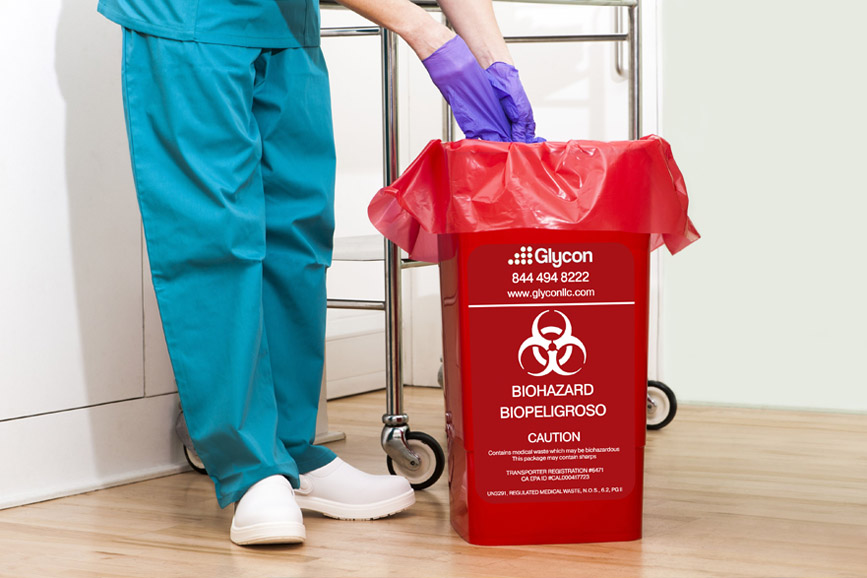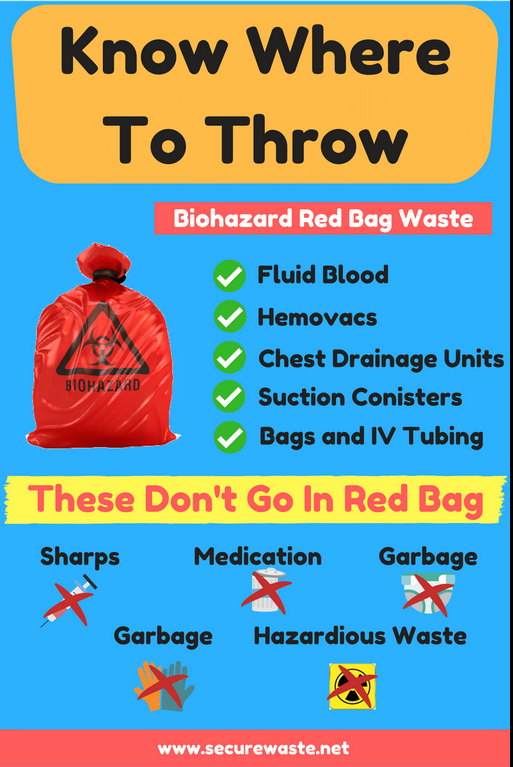Guardians of Cleanliness: Citizen Medical Waste Removal Service for Your Satisfaction
The Importance of Appropriate Medical Garbage Disposal: A Guide for Medical Care Facilities
Proper clinical waste disposal is an essential aspect of healthcare center administration, making sure the safety and well-being of patients, team, and the setting. From recognizing the various classifications of clinical waste to adhering to regulative demands, medical care centers should adopt reliable waste partition practices and pick appropriate disposal approaches. Nevertheless, the importance of proper clinical garbage disposal exceeds mere compliance; it is an obligation that calls for continuous training and education for staff. In this guide, we will certainly discover the numerous aspects of clinical waste disposal and highlight the important actions that healthcare facilities need to take. By carrying out these techniques, healthcare facilities can minimize risks, shield public health, and contribute to a cleaner, much safer environment.
Understanding Clinical Waste Categories
Understanding medical waste groups is important for appropriate disposal in healthcare centers. Medical waste is a wide term that incorporates different types of waste produced in healthcare setups, such as medical facilities, clinics, and research laboratories. Classifying medical waste aids guarantee that it is handled, stored, and disposed of safely and based on appropriate guidelines.
There are a number of classifications of medical waste that medical care facilities require to be conscious of. These groups include infectious waste, sharps waste, pharmaceutical waste, chemical waste, and contaminated waste (medical waste disposal services with WasteX). Each group has specific features and calls for various disposal techniques to reduce the risk of damage to health care employees, individuals, and the environment
Contagious waste, for instance, refers to throw away contaminated with possibly transmittable products, such as blood, body liquids, and cells. Drug waste is composed of ended or unused medicines, while chemical waste is composed of harmful chemicals used in clinical procedures.
Conformity With Regulatory Requirements
Health care centers should ensure compliance with governing demands for appropriate clinical waste disposal. Governing bodies, such as the Epa (EPA) and the Occupational Security and Wellness Administration (OSHA), have developed guidelines and guidelines to guard public health and wellness and the setting. These laws outline the proper handling, storage, transport, and disposal of medical waste.
Conformity with regulative needs is important for health care centers to prevent legal charges, reputational damage, and prospective harm to human health and wellness and the environment. Failing to follow these laws can cause penalties, lawsuits, and even the suspension or cancellation of operating licenses.
To ensure conformity, health care centers must develop comprehensive waste administration programs that include personnel training, appropriate waste segregation, and making use of proper containers and tags. Routine audits and examinations should likewise be performed to identify any type of non-compliance problems and address them without delay.
It is vital for health care centers to keep up to date with changes in policies and update their waste administration techniques accordingly. This can be attained by actively keeping track of updates from regulatory bodies and joining training programs and workshops.
Implementing Reliable Waste Partition Practices
To guarantee correct medical waste disposal, medical care facilities should carry out reliable waste segregation techniques. Waste segregation is an important step in the total waste monitoring procedure, as it helps minimize the danger of infection, prevents cross-contamination, and ensures the risk-free disposal of various kinds of waste. Reliable waste segregation methods entail dividing clinical waste into various classifications based on its features and possible risks.
One usual technique is the segregation of sharps waste, such as scalpels and needles, from other sorts of medical waste. Sharps waste must be positioned in puncture-resistant containers to avoid injuries and prospective infections. Furthermore, contaminated materials, such as chemicals and drugs, need to be divided from general clinical waste to avoid ecological contamination.
Proper labeling and color-coding of waste containers are crucial for effective waste partition. Visible and clear tags must be put on each container to show the kind of waste it contains and any type of special delivery needs - medical waste disposal services with WasteX. Furthermore, color-coding can be utilized to set apart between different waste categories, making it much easier for medical care staff to determine and dispose of waste correctly
Routine training and education and learning for medical care personnel is vital for the effective execution of waste segregation techniques. Personnel members ought to be enlightened on the different waste classifications, correct segregation strategies, and the value of adhering to waste administration methods. This will certainly assist guarantee compliance and uniformity in waste partition techniques throughout the facility.
Deciding On Appropriate Disposal Methods
Proper selection of suitable disposal techniques is necessary in making sure the eco accountable and safe management of clinical waste in healthcare facilities. Health care centers create a variety of medical waste, consisting of sharps, contagious waste, pharmaceutical waste, and chemical waste - medical waste removal near me. Each sort of waste calls for particular disposal techniques to lessen the danger of contamination, injury, and environmental harm
One usual disposal method for medical waste is incineration. Incineration involves the controlled burning of waste at high temperature levels.

Chemical sanitation is one more method utilized for sure sorts of clinical waste, such as pharmaceutical waste. This approach makes use of chemicals to neutralize or ruin impurities. However, it is essential to select chemicals that are eco pleasant and safe.
In some situations, land fill disposal might be suitable for non-hazardous medical waste (medical waste disposal services with WasteX). However, correct partition and packaging are vital to avoid leak or contamination.
Eventually, medical care centers need to carefully evaluate the qualities of their clinical waste and pick proper disposal approaches that focus on safety and security, environmental management, and regulatory conformity. Routine medical waste disposal services with WasteX training and tracking are necessary to make sure that health care personnel complies with proper disposal procedures.

Training and Educating Team on Proper Disposal Procedures
Team education and learning and training play a crucial role in guaranteeing the appropriate disposal of medical waste in healthcare facilities. It is essential that all team members, including physicians, registered nurses, specialists, and assistance personnel, obtain extensive training on correct disposal treatments. This training needs to cover the different sorts of medical waste, their possible threats, and the appropriate techniques for dealing with, setting apart, and getting rid of them.
Among the key objectives of staff education and learning and training is to guarantee that all health care specialists recognize the importance of proper disposal treatments and the possible effects of improper waste administration. They require to be conscious of the risks connected with medical waste, such as the transmission of infections and the contamination of the setting. medical waste removal services. By comprehending these risks, team member will certainly be much more determined to comply with proper disposal procedures and take the essential precautions to shield themselves, their colleagues, and the area
Training ought to likewise cover the usage of individual safety tools (PPE) and the proper strategies for taking care of medical waste. Team member need to be enlightened on exactly how to determine and segregate various types of waste, such as sharps, infectious waste, and dangerous chemicals. They must likewise be trained on the proper use of waste containers, such as sharps containers and biohazard bags, in addition to the relevance of labeling and sealing these containers properly.
Moreover, team education and learning and training must consist of normal updates and refresher course programs to make sure that healthcare specialists remain notified about the most recent guidelines and best practices in medical waste disposal. This continuous education is crucial to keep a high degree of recognition and conformity amongst employee.
Final Thought
In final thought, proper medical waste disposal is of utmost relevance for health care facilities. Comprehending the various categories of clinical waste and conforming with regulative demands makes certain why not find out more the safety and wellness of both medical care workers and the basic public.
From comprehending the various groups of clinical waste to abiding with regulative needs, health care facilities should take on reliable waste segregation techniques and select appropriate disposal methods. These groups consist of infectious waste, sharps waste, pharmaceutical waste, chemical waste, and radioactive waste.To ensure correct medical waste disposal, healthcare facilities must implement efficient waste partition practices. Waste partition is a crucial step in the overall waste monitoring procedure, as it helps reduce the danger of infection, avoids cross-contamination, and ensures the secure disposal of check these guys out different types of waste. Medical care centers produce a variety of medical waste, including sharps, contagious waste, pharmaceutical waste, and chemical waste.